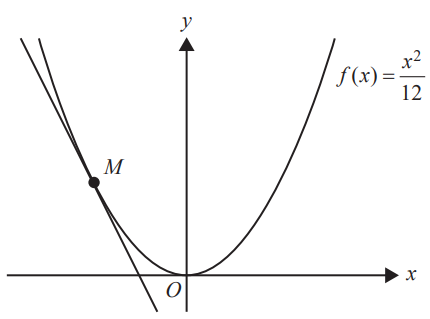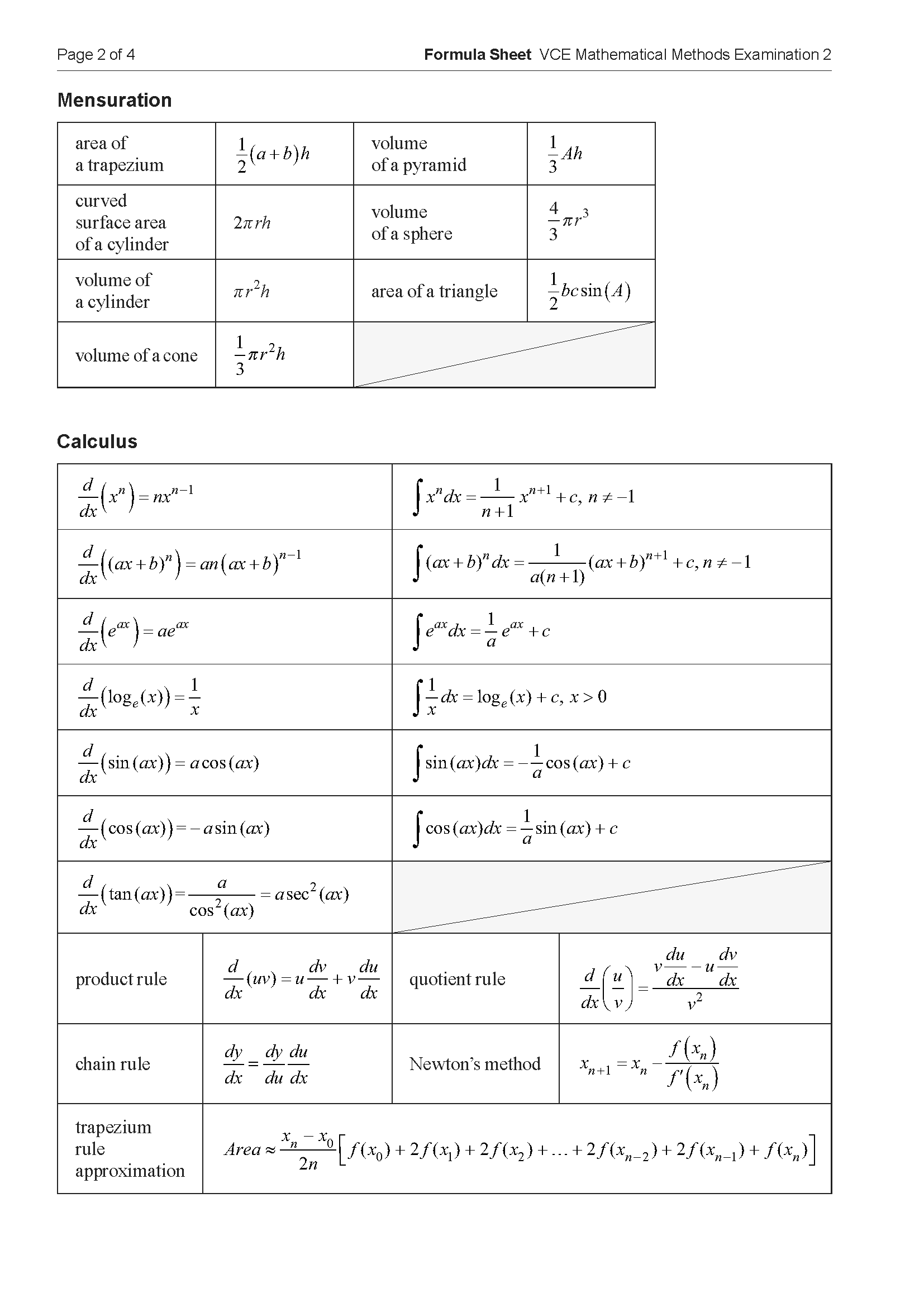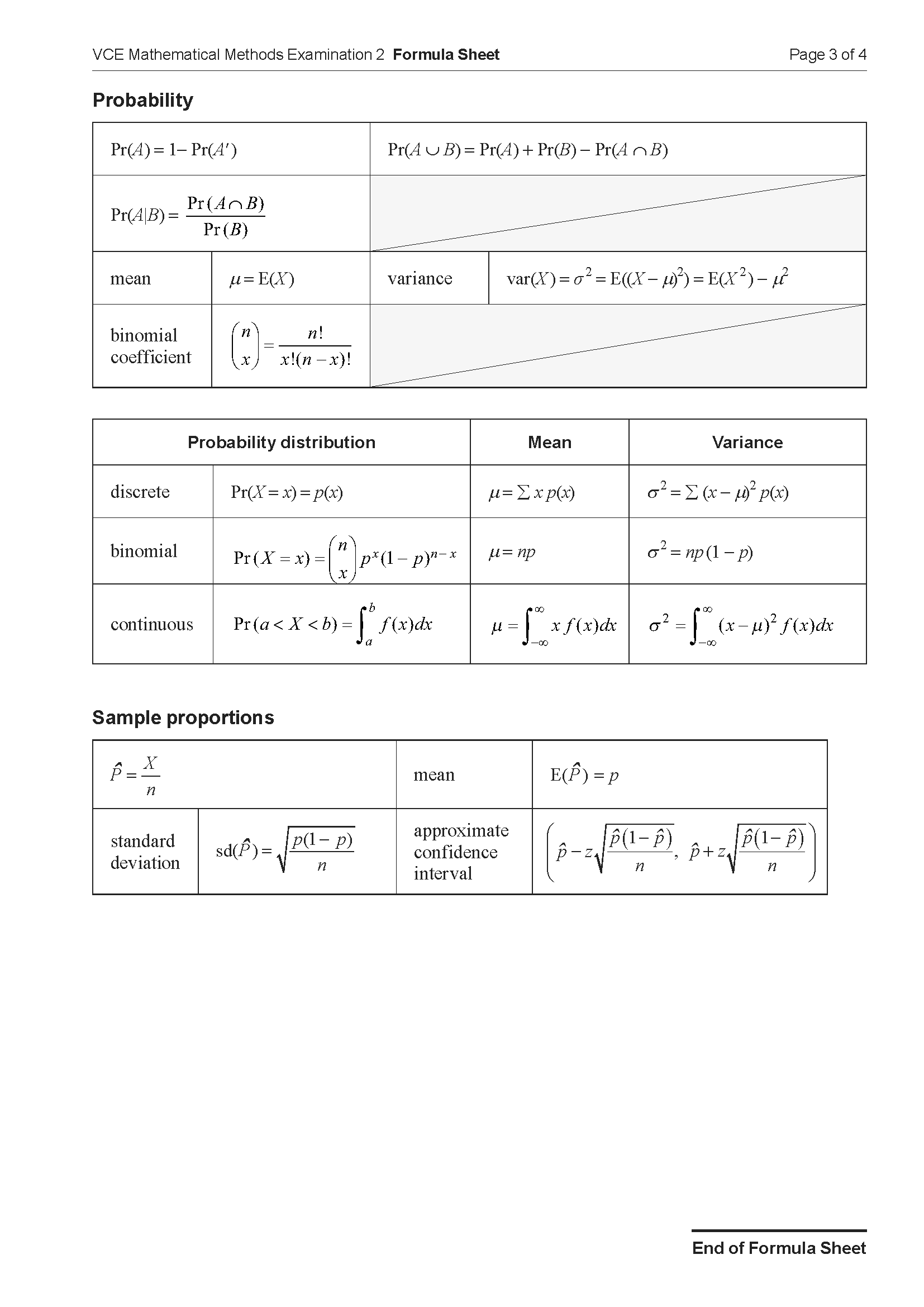VCE Maths Methods Parabolas Mini Test
Number of marks: 8
Reading time: 2 minutes
Writing time: 12 minutes
Section A – Calculator Allowed
Instructions
• Answer all questions in pencil on your Multiple-Choice Answer Sheet.
• Choose the response that is correct for the question.
• A correct answer scores 1; an incorrect answer scores 0.
• Marks will not be deducted for incorrect answers.
• No marks will be given if more than one answer is completed for any question.
• Unless otherwise indicated, the diagrams in this book are not drawn to scale.
For the parabola with equation \( y = ax^2 + 2bx + c \), where \( a, b, c \in \mathbb{R} \), the equation of the axis of symmetry is
- A. \( x = -\frac{b}{a} \)
- B. \( x = -\frac{b}{2a} \)
- C. \( y = c \)
- D. \( x = \frac{b}{a} \)
- E. \( x = \frac{b}{2a} \)
Find all values of \( k \), such that the equation
\( x^2 + (4k + 3)x + 4k^2- \frac{9}{4} = 0 \)
has two real solutions for \( x \), one positive and one negative.
- A. \( k > -\frac{3}{4} \)
- B. \( k \geq -\frac{3}{4} \)
- C. \( k > \frac{3}{4} \)
- D. \( -\frac{3}{4} < k < \frac{3}{4} \)
- E. \( k < -\frac{3}{4} \text{ or } k > \frac{3}{4} \)
The largest value of \( a \) such that the function \( f : (-\infty, a] \to \mathbb{R}, f(x) = x^2 + 3x - 10 \) is
- A. –12.25
- B. –5
- C. –1.5
- D. 0
- E. 2
The maximal domain of the function with rule \( f(x) = \sqrt{x^2 - 2x - 3} \) is given by
- A. \( (-\infty, \infty) \)
- B. \( (-\infty, -3) \cup (3, \infty) \)
- C. \( (-1, 3) \)
- D. [–3, 1]
- E. \( (-\infty, -1] \cup [3, \infty) \)
The set of values of \(k\) for which \(x^2 + 2x - k = 0\) has two real solutions is
- A. \(\{-1, 1\}\)
- B. \((-1, \infty)\)
- C. \((-\infty, -1)\)
- D. \(\{-1\}\)
- E. \([-1, \infty)\)
The equation \((p - 1)x^2 + 4x = 5 - p\) has no real roots when
- A. \(p^2 - 6p + 6 < 0\)
- B. \(p^2 - 6p + 1 > 0\)
- C. \(p^2 - 6p - 6 < 0\)
- D. \(p^2 - 6p + 1 < 0\)
- E. \(p^2 - 6p + 6 > 0\)
The turning point of the parabola \(y = x^2 - 2bx + 1\) is closest to the origin when
- A. \(b=0\)
- B. \(b = -1\) or \(b=1\)
- C. \(b = -\frac{1}{\sqrt{2}}\) or \(b = \frac{1}{\sqrt{2}}\)
- D. \(b = \frac{1}{2}\) or \(b = -\frac{1}{2}\)
- E. \(b = \frac{1}{4}\) or \(b = -\frac{1}{4}\)
End of Section A
Section B – Calculator Allowed
Instructions
• Answer all questions in pencil on your Multiple-Choice Answer Sheet.
• Choose the response that is correct for the question.
• A correct answer scores 1; an incorrect answer scores 0.
• Marks will not be deducted for incorrect answers.
• No marks will be given if more than one answer is completed for any question.
• Unless otherwise indicated, the diagrams in this book are not drawn to scale.
The diagram below shows part of the graph of \( y = f(x) \), where \( f(x) = \frac{x^2}{12} \).

a. State the equation of the axis of symmetry of the graph of \( f \). 1 mark
End of examination questions
VCE is a registered trademark of the VCAA. The VCAA does not endorse or make any warranties regarding this study resource. Past VCE exams and related content can be accessed directly at www.vcaa.vic.edu.au

